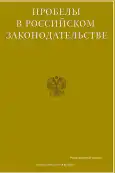Economic Crimes as a Threat to the National Security of the Russian Federation: Criminal Law Aspect
- Authors: Shuisky A.S.1
-
Affiliations:
- Pyatigorsk Institute (branch) of the North Caucasus Federal University
- Issue: Vol 15, No 1 (2022)
- Pages: 177-180
- Section: Articles
- URL: https://journal-vniispk.ru/2072-3164/article/view/147437
- ID: 147437
Cite item
Abstract
This article discusses economic crimes as a threat to the national security of the Russian Federation. The article notes that in the last two years there has been a steady increase in the number of economic crimes in Russia. Such crimes are of a hidden nature and cause serious damage, undermining the socio-economic stability in the country. In addition, the author notes that, despite the large-scale work being carried out, the activities of state authorities and law enforcement agencies to combat crime in the economic sphere are insufficient. The increasing scale of economic crime is becoming a real threat to the national security of the country, which confirms the relevance of the topic of this article. The purpose of writing this article is an attempt to comprehensively consider the relationship between economic crimes and ensuring the national security of Russia. The object of the study is economic crimes considered as a threat to the national security of the Russian Federation. The subject of the study is the legal norms and scientific and methodological foundations for the study of economic crimes and their relationship with ensuring the national security of Russia. The methodological basis of the research is such general scientific methods as the method of general theoretical modeling and the method of logical analysis and synthesis. Thus, the article concludes that today, there is an urgent need to develop modern measures to effectively counter economic crime.
Full Text
##article.viewOnOriginalSite##About the authors
Andrey Sergeevich Shuisky
Pyatigorsk Institute (branch) of the North Caucasus Federal University
Email: ashuiskii@ncfu.ru
Cand.Sci.(Law), associate professor of the department of criminal law, process and criminalistics Pyatigorsk, Russia
References
- The Criminal Code of the Russian Federation No. 63-FZ of 13.06.1996 (as amended on 30.12.2021) // Collection of Legislation of the Russian Federation. 1996. No. 25. St. 2954.
- Federal Law No. 390-FZ of 28.12.2010 (as amended on 09.11.2020) "On Security" // Collection of Legislation of the Russian Federation. 2011. No. 1. Article 2.
- Decree of the President of the Russian Federation No. 400 dated 02.07.2021 "On the National Security Strategy of the Russian Federation" // Collection of Legislation of the Russian Federation. 2021. No. 27 (Part II). Article 5351.
- Dementiev N.V. Economic security in the structure of national security of modern Russia // Socio-economic phenomena and processes. 2011. No. 5-6 (27-28). pp. 76-82.
- Kaskov D.L., Rudakova O.V. Economic crime as a threat to economic security of Russia // Central Russian Bulletin of Social Sciences. 2016. No. 6. Vol. 11. pp. 299-307.
- Kuznetsova E.I., Filatova I.V. Economic crime and its impact on economic security // Bulletin of Economic Security. 2017. No. 3. pp. 201-204
- Menshikova E.A. Economic crime as a threat to the economic security of Russia and its regions // Bulletin of TOGU. 2020. No. 1 (56). pp. 71-80.
- Osipov I.V. Features of the qualification of crimes in the sphere of economic activity : abstract. dis. ... cand. jurid. M., 2019. 26 p .
- The state of crime in the Russian Federation for January-December 2021 [Electronic resource] // Official website of the Ministry of Internal Affairs of the Russian Federation. - URL: https://мвд.рф/reports/item/28021552
- Taktoeva V.V. The concept of economic crime and the problems of qualification of crimes in the field of economics // Criminalistics: yesterday, today, tomorrow. 2018. No. 2 (6). pp. 69-73.
Supplementary files








